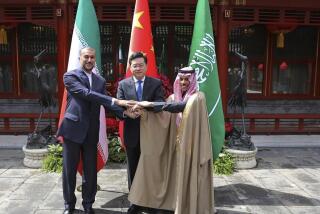Britain plans to reopen its embassy in Iran amid improving relations
- Share via
Relations between Britain and Iran have improved in recent months and “circumstances are right” to reopen the British Embassy in Tehran, Foreign Secretary William Hague said Tuesday.
The election a year ago of moderate Iranian President Hassan Rouhani and talks in recent months between Iran and six global powers on curbing Iran’s nuclear ambitions have brought about a significant change in the relationship between London and Tehran, Hague said.
British Prime Minister David Cameron also called for restoration of normal relations with Tehran at a time when the Middle East is under threat by Islamic extremists.
“Britain believes in and I believe in step by step building our relationship with Iran because we need to have proper dialogue with that country,” Cameron told reporters at a London news conference. “We are having dialogue over the nuclear weapons issue and I think we should be having dialogue with it on issues of regional security.”
Shiite Muslim-ruled Iran has offered assistance to the government of Iraqi Prime Minister Nouri Maliki in its battle to turn back Sunni Muslim militants who have seized much of northern and western Iraq and threaten to march on the capital, Baghdad.
Like the United States, Britain had endured strained relations with Tehran during the eight-year rule of hard-line President Mahmoud Ahmadinejad, whose term ended last summer.
A career clerical hierarchy insider, Rouhani surprised Western critics when he oversaw a serious turn in the protracted negotiations with the six powers -- the United States, Britain, France, Russia, China and Germany -- over concern that Iran was trying to build nuclear weapons. Rouhani committed his nation to pursuing only civilian uses of nuclear energy, leading to a November agreement to hammer out a permanent pact with the six countries by late next month.
The swift-moving Islamic State of Iraq and Syria insurgent force in Iraq has spurred interest among Western nations, especially the United States and Britain, to collaborate with Tehran on ways to halt the ISIS fighters’ drive to create a fundamentalist Islamic caliphate spanning conquered territory in Iraq and Syria.
“No one should be in any doubt that what we see in Syria and now in Iraq in terms of ISIS is the most serious threat to Britain’s security that there is today,” Cameron said.
London suspended diplomatic relations with Iran in November 2011, after militants attacked and ransacked the British Embassy in Tehran, an “appalling” violation of Britain’s rights that brought relations to “an all-time low,” Cameron said.
It was unclear when the British mission in Iran would reopen. Hague said he spoke by telephone on Saturday with Iranian Foreign Minister Mohammad Javad Zarif and that they made significant progress in repairing diplomatic ties.
“Our two primary concerns when considering whether to reopen our embassy in Tehran have been assurance that our staff would be safe and secure, and confidence that they would be able to carry out their functions without hindrance,” Hague said in a statement to Parliament.
“Iran is an important country in a volatile region, and maintaining embassies around the world, even under difficult conditions, is a central pillar of the U.K.’s global diplomatic approach,” Hague said. “I have therefore now decided the circumstances are right to reopen our embassy in Tehran.”
The U.S. Embassy in Tehran has been closed since the end of the 1979-80 hostage crisis during which the American diplomats and staffers were held captive for 444 days by militant Islamic revolutionaries.
Follow @cjwilliamslat for the latest international news 24/7
More to Read
Sign up for Essential California
The most important California stories and recommendations in your inbox every morning.
You may occasionally receive promotional content from the Los Angeles Times.














